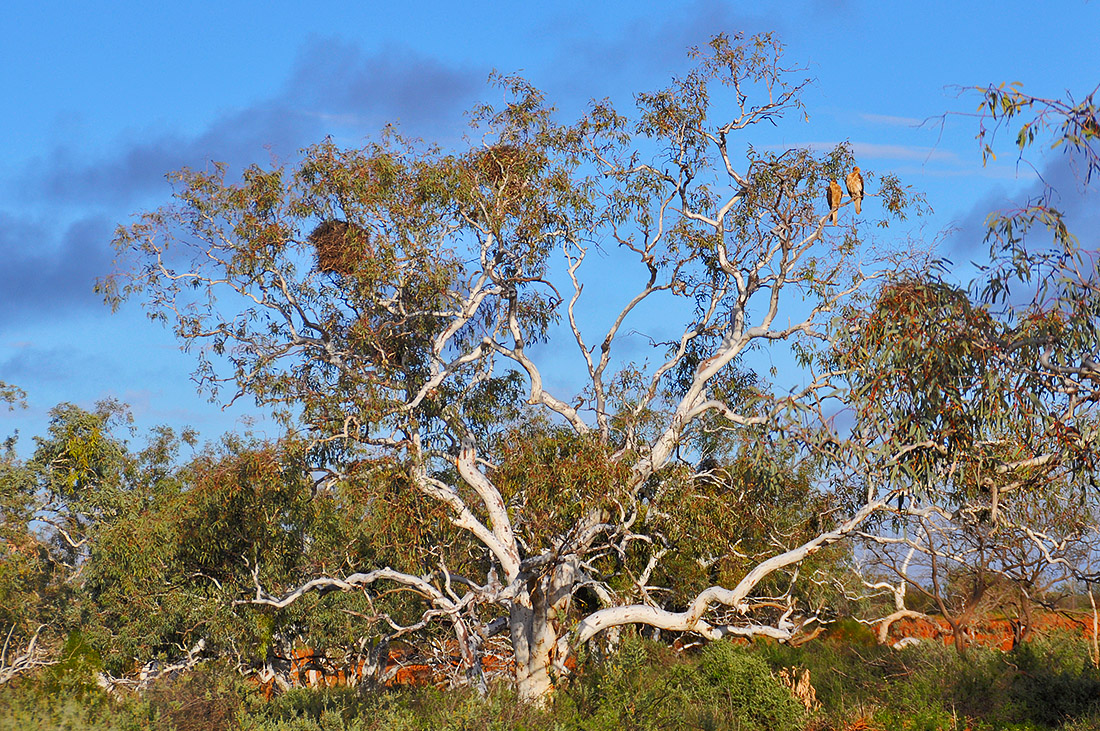
A CALL FOR
bush regeneration
In the wake of the pandemic, there lies an opportunity to make meaningful change.
Words: Nick Rodway
The memory is clear: Down by the river, a breeding pair of wedge-tail eagles erupted out of a nest in a gnarled river red gum. The roost was so big it could house a child, and the birds wheeled above us like protector spirits. We could only watch on in awe.
Seeing such a phenomenon was typical of each day I spent recently coordinating a bush crew team to revegetate the grasslands and open forests of western Victoria. Teams like the one I was part of are currently operating across the state, working to manage the land. Some are fencing areas affected by the Black Summer fires, some heading off after feral animals, and more still regenerating watersheds across our precious catchment areas.
Significantly, these programs were and are largely funded by the Victorian state government as a stimulus initiative. At the peak of the pandemic last year, bush jobs were quickly created to get people back into employment, and scores of people who found themselves jobless jumped at the opportunity to go and work on the land. Many had no prior experience of environmental management before they started.
Toiling away beneath the wedgies, it seems like the ideal advertisement for stewardship of country. And conservation jobs are ideal in that a difference is always being made, even though most days of work involve slogging away in the mud or heat. But despite the importance of bush crew jobs, few employed on these programs have any delusions that the work, as we are seeing it now, will continue.
Remember the Green Army? Funding for rangers in numerous First Nation communities? These and other programs like them have either been abandoned or curtailed in the past, partly because there is no immediate, fiscal value to place on environmental outcomes.
Conservation is the forgotten sector. It is wheeled out and pork barrelled at election time, promised endless financial backing but expected to operate on platitudes and the cheap two-stroke oil that’s guzzled by brush cutters and chainsaws out in the field.
Remember the Green Army? Funding for rangers in numerous First Nation communities? These and other programs like them have either been abandoned or curtailed in the past, partly because there is no immediate, fiscal value to place on environmental outcomes. Sure, those weeds aren’t there anymore, maybe a few trees managed to sprout; without ongoing management, however, the results are quickly forgotten as conservation jobs are lost in budget cuts and, ultimately, left to either private enterprise or volunteers and Landcare networks to sort out for themselves.
Consequently, those who manage to retain the few permanent conservation jobs out there are often left with limited funds and the unenviable task of trying to convince government that a project is working and worth ongoing funding. In our age of instantaneous results, it’s sometimes hard to compute that a plant takes time to grow, and that not all things can be immediately assessed.
As it stands, the government employment initiatives we now see across the country don’t need to do this. In the coming months, many conservation contracts are due to be completed, and hundreds will find themselves unemployed. Given the success of the programs, the question has to be asked—why can’t bush jobs continue to be funded?
As we enter a global recession, it appears that here is a unique possibility to tie two significant issues together: unemployment and the regeneration of the natural environment. City dwellers are running for the regions, with young people in particular reaching out to reconnect with the bush after months stuck inside metropolitan lockdown. In addition, we are yet to see the full extent of the mental health crisis, which some experts have suggested was accentuated—particularly in Victoria—by not being able to be within a natural environment, like a forest or the ocean.
The combination of working outside, physical activity, and meaningful employment is one way to address these issues. The potential for success is there, if government is willing to look ahead and see that land management is important not just to the wellbeing of our shared environment but to the health of the person working out in the field.
As we wake from the fever dream of the last year, the opportunity is there to see the regeneration of country as a civic necessity, subsidised—as it is now through these bush programs—alongside health and public education.
But until the importance of conservation is recognised, by both government and the wider public, the contracts will stop, the weeds will return, and the watersheds will erode more than ever. It’s a choice that will have to be made in the coming months.

